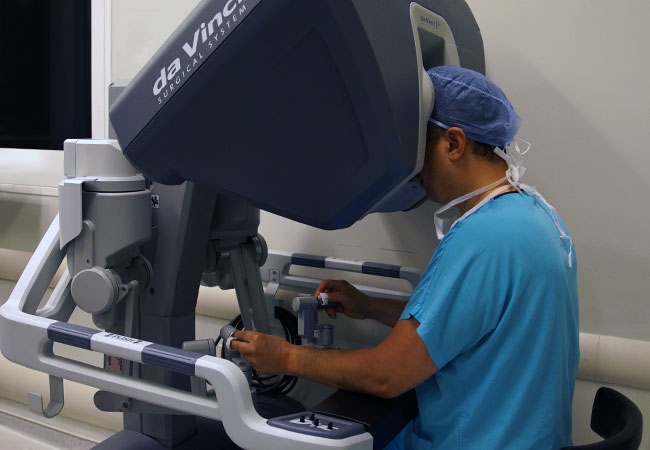Important structures surround the prostate, which is located at the base of the pelvis and just below the bladder. The nerves that pass adjacent to the prostate capsule are responsible for penile erection. Similarly, the muscle structures that allow for urinary continence are located close to both the bladder and prostate tissue.

During robotic prostate cancer surgery, it is crucial that these structures remain undamaged while cancerous tissue is removed. The main goal here is to remove the prostate without leaving behind cancerous tissue, to protect the nerves that keep sexual functions going, and to keep the structures that keep urine from leaking out of the body from getting damaged while the prostate is removed.
A robot with four arms. One of these arms contains a camera for viewing the interior of the abdomen, while the remaining three arms contain robotic surgical instruments that allow the surgeon to perform surgery. At the level of the patient's navel, incisions measuring between 8 mm and 12 mm are made to insert these arms into the abdomen. Through these incisions, a robotic camera and robotic surgical instruments are then sent into the abdomen.
Additionally, a 12 mm incision is made for the surgical assistant, who assists the surgeon during the procedure. As a result, five 8–12 mm incisions are made in the patient's abdomen during robotic surgeries for prostate cancer. The cancerous prostate tissue is put in a special bag after robotic prostate cancer surgery. At the end of the procedure, one of these cuts is made a little bigger, and the prostate is taken out through this hole.
Robotic prostate cancer surgery can be used to treat patients with prostate cancer whose disease is localized to the prostate and has not spread (metastasized). When deciding whether to perform robotic prostate cancer surgery, the patient's overall health and any co-existing conditions must also be taken into account.
The prostate is an organ that is surrounded by significant structures and is situated at the base of the pelvis, just below the bladder. Erection is provided by the nerves that directly cross the prostate capsule. It is crucial in robotic prostate cancer surgery that these structures are not harmed while the cancerous tissue is removed.
The main goals here are to remove the prostate while avoiding the spread of cancerous tissue and to safeguard the nerves that support continued sexual activity.
The cost of robotic prostate cancer surgery varies depending on the patient and a few different variables. The anticipated patient medical characteristics and the length of the hospital stay have an impact on the cost of the surgery. This calls for considering other factors before providing patients with a price.
One company charges dollars for robotic surgery, robotic arms used on the patient, and robotic prostate surgery. The price includes the robotic surgery system as well as the cost of the surgery and the hospital stay. Due to this, the cost of robotic surgery may be higher than that of laparoscopic surgery.
In traditional open surgery, a 15-centimeter incision is made under the umbilicus of the patient. The patient and the surgical team face numerous obstacles during open surgery. This surgery presents a number of difficulties for the patient, including a lengthy hospital stay, a high risk of wound infection, a large scar, and a prolonged period of recovery after the operation.
Long operation times and increased complication rates present difficulties for the surgical team as a result of the restricted surgical field, insufficient hand movements, and a good field of view.
During prostate surgery, the thin structure, mobility, anti-tremor working principle, and advanced image systems of the robotic system's operating arms make it easier to protect structures close to the prostate. Because of this, there is less chance of problems during the operation, less blood is lost, and the operation takes less time.Pain relief, a shorter recovery time, loss of sexual function, and persistent urinary incontinence, all of which have a big effect on social life, will get better over time after surgery.
Like all other surgeries, robotic prostate cancer surgery has some risks related to anesthesia. Before surgery, each patient is evaluated by an anesthesiologist in order to assess and minimize these risks. However, it may be necessary to return to open surgery during surgery due to possible adhesions or bleeding. This is an uncommon complication in surgeries performed by experienced surgeons.
Despite its superior mobility and vision, the robot is controlled by a surgeon. The only way robotic prostate cancer surgery can have a successful outcome is if it is performed by an experienced surgical team using a specific technique. These technical differences determine the frequency of side effects that may occur immediately after surgery or many years thereafter.
The duration of robotic prostate cancer surgery can vary depending on a number of patient-specific factors. The duration of the operation is affected by different factors such as the patient's weight, the size and location of the tumor, the necessity of lymph node dissection, and the patient's surgical history. In addition, the surgeon's experience is one of the most significant factors influencing the duration of the operation.